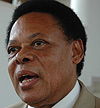Farmers’ activist groups from all member countries of the East African Community are not happy with the performance of the regional bloc’s technical operations, particularly the EAC policy on cross border farming and trading activities.


Farmers’ activist groups from all member countries of the East African Community are not happy with the performance of the regional bloc’s technical operations, particularly the EAC policy on cross border farming and trading activities.
Appealing to the EAC secretary general’s office in Arusha yesterday, the activists grouped together under their lobbying umbrella organization the Eastern Africa Farmers Federation-(EAFF), said the, "EAC was operating like a project of political leaders alone. They talk about the customs policy of the region has not been explained to farmers yet we are the most important sector in the region,” wondered Andrew Hepelwa a Tanzanian farmer and Executive member of the EAFF.
The EAC is currently in negotiations to have a uniform customs policy in all its five member countries. President Paul Kagame has been on record calling for faster cross border services to travelers from one country to another in the region. Kagame has also noted that this would spur economic development in the region.
However, the farmers said that Burundi was charging Visa fees to Tanzanian citizens going to that country while Tanzania had slapped an embargo on all agricultural exports from Tanzania to other member countries of the EAC.
Ms Joseph Josephine, the Policy and Advocacy advisor of the group said, "The leadership of the community is mainly discussing paper work and ignoring the real issues of the residents of the region.”
The lobbyists said they were concerned that if the leaders continued taking such issues as agriculture lightly, the region would soon suffer from food shortage and famine.
Their warning comes at a time when other regions of the world have suffered violent outbreaks in urban centres due to increasing food prices.
The high prices of wheat, rice and beans have caused widespread violent outbursts in South Africa , Egypt , Ivory Coast , Cameron and currently in Argentina .
The Secretary General of the EAC Juma Mwapachu could not be reached for comment.
The UN Secretary General Ban Ki Moon has on many occasions stated that increasing food prices will soon cause international political upheavals with citizens rising up against their governments due to higher costs of living which have made many people unable to access basic services. Ki Moon says that the high food prices are caused by rising fuel prices.
The EAFF officials said they wanted a positive dialogue with the EAC secretariat so that their issues can be considered by policy makers.
They said that currently they only hear about the community through the media.
Chebet Maikut, the Vice President of the lobby group said,”Our members are not happy. Career farmers are not able to move freely across borders of the EAC to sell their products. Farmers are also not aware about the customs policy and what it is about.”
"Who owns the EAC? Is it the leaders or the people?’ asked Steven Muchiri the Chief Executive of EAFF from Kenya.
The EAFF is a lobby body for all farmers in Eastern Africa.
It was formed in 2001 with the aim of promoting regional integration of farmers through trade and good neighborliness. In Rwanda its affiliate members are Imbaraga National Farmers’ Association and Ingabo, a provincial cooperative based in Huye, Southern Province.
Formed in 1967, the EAC seeks to unite all citizens of East Africa under uniform political, economic and social policies.
Ends


